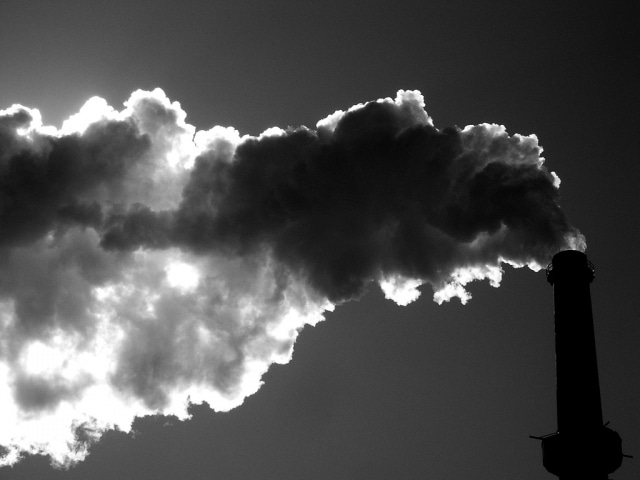This DeSmog UK epic history post describes how an economic think tank became a beacon of light around which the industries most affected by the new Kyoto Protocol met to discuss strategies to deal with the international agreement.
The first time is tragedy – the second time is farce. Lord Lawson, the former chancellor, is today the chairman of the Global Warming Policy Foundation.
The member of the House of Lords claims that his registered charity, which attacks policy designed to prevent climate change, has no financial links to the oil industry.
Twenty years ago, Lord Lawson was chairman of another charity. This one was specifically established to represent the oil industry, building bridges with senior politicians and civil servants.
This charity was directly funded by Shell and BP, and it held a conference in which the science and policy of climate change were roundly attacked.
Lessons From the Past
They say ‘once burned, twice shy’. So what can we learn about the history of Lord Lawson’s involvement with energy industry front groups when assessing his claim to be an impartial arbiter of climate science today?
Lawson was president of the British Institute of Energy Economics (BIEE) at the time of the Kyoto Protocol’s adoption in the late ‘90s.
The London-based charitable think tank was heavily funded by BP, Shell and other oil companies to foster closer relationships between the energy industry, politicians and the captains of the civil service.
As such, the BIEE became a beacon of light around which the industries most affected by the new international agreement met to discuss strategies.
The charity held a two-day event titled Climate After Kyoto—Implications for Energy at Chatham House in February 1998 at which John Browne from BP was the keynote speaker.
‘Beyond Denial’
“We are at a historic moment. A moment of great opportunity,” Browne told the assembled civil servants and energy executives. “Kyoto and the debate around it has demonstrated that the issue is being taken seriously. We have moved – as the psychologists would say – beyond denial.”
He added: “That is not to say we’ve reached the point of scientific certainty. We haven’t. The science of climate change is still provisional. Maybe it always will be … but there is a growing consensus that this is an issue we have to take seriously.”
Browne explained that BP had been attacked when he first spoke about climate change nine months earlier, when he was accused of “taking a maverick view”, “breaking ranks with our colleagues” and “leaving the church”.
Browne praised his rivals at Shell and Texaco for supporting climate action at Davos the week before and even welcomed government intervention. But this praise for Kyoto was not echoed by all of the BIEE speakers.
Industry Divided
The other industrialists appeared divided in how they should approach Kyoto, with many claiming their chosen fossil fuel had a future while others might not.
Noticeably, none attacked the science of climate change or the work of the UN Intergovernmental Panel on Climate Change, and only the most sceptical dared challenge the recognised environmental implications of burning fossil fuels.
Walter van de Vijver, the chief executive of Shell International Gas, Dr Mohammad Al-Sabban, the senior economic advisor to the Saudi Arabian Oil Ministry, and Ron Knapp of the World Coal Institute spoke at the event.
The man from Shell told guests that “easily available and affordable energy from fossil fuels has shaped the world we live in today” and concluded somewhat surprisingly that Kyoto meant that “gas is the fuel for the 21st century”.
Knapp brought along a PowerPoint presentation which informed the napping delegates that his was the single biggest fuel used in generating electricity in the world, and that improvements in efficiency would reduce the amount of emissions his industry poured into the atmosphere.
Discriminating Against Coal
Knapp provided a thorough, but rather technical, attack on the Kyoto agreement. He complained that “coal is the soft target for campaigners against climate change” and offered the robust defence that “coal is only one of the contributors to the expansion in manmade greenhouse gas emissions, particularly in Europe.”
Knapp claimed that the new agreement would simply cause the “flight” of emissions, investment and jobs to countries not yet forced to reduce emissions.
The man from coal concluded defiantly: “The World Coal Institute will fight against the introduction of policies that discriminate against coal.”
Lawson, who remained president of the BIEE for nine years and often delighted its members with his witty and insightful after-dinner speeches, told me that he did not attend this particular event. It would still be some time before he would promote his own views on Kyoto.
Next up on the DeSmog UK epic history series, we look at the creation of Michael Mann’s hockey stick graph and the counter-attack launched by the climate deniers.
Photo: Señor Codo via flickr
Subscribe to our newsletter
Stay up to date with DeSmog news and alerts







